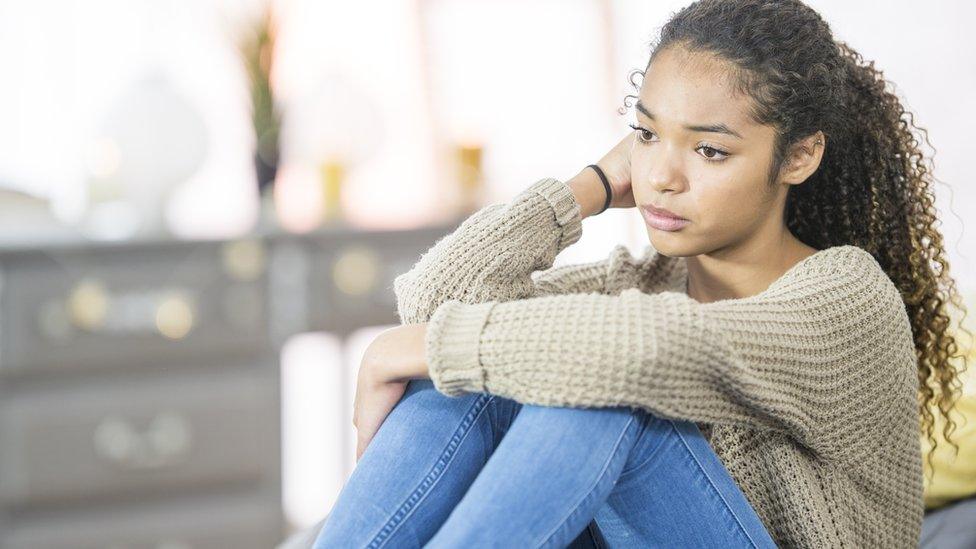Mental health: Girls' self-esteem drops sharply at 14, report finds
- Published
- comments

A report by the Education Policy Institute (EPI) and The Prince's Trust, looking at the mental health and wellbeing of young people, reveals how social media, relationships, and background play a big role in how young people feel.
The research, which focused on the personal experiences of 11, 14 and 17 year-olds in England, showed that the wellbeing of all young people declines by the end of their teenage years, but this decline is much greater for girls and by the age of 14 girls' wellbeing and self-esteem falls dramatically.
The EPI also highlighted how the coronavirus pandemic is likely to increase existing mental health and wellbeing problems among young people and that social isolation risks "causing long-term damage to the wellbeing of hundreds of thousands of young people."
WATCH: Psychologist Laverne Antrobus has some advice for looking after yourself
What else did the report find?
The report found that by the end of primary school, girls and boys have similar levels of wellbeing and as they move into secondary school the wellbeing and self-esteem of boys and girls begins to drop.
However, girls see a more significant drop in their wellbeing and self-esteem at 14 and at 17.
Feelings of depression rise among both boys and girls between the ages of 14 and 17 but increase more for girls. National estimates show that one in six young people now have a probable mental illness - up from one in nine.
While the majority of young people remain happy with their lives as they enter secondary school, the proportion of girls who are unhappy rises.
Researchers say that one main factor for this fall in happiness is personal appearance. Between the ages of 11 and 14, the amount of girls who feel unhappy about their appearance almost doubles from around one in seven (15%) to around one in three (29%).
WATCH: Mrs. T's top tips on mindfulness
Why is this happening?
There are several factors that impact the mental health and wellbeing of young people. They include:
Social media
It might be the place where you catch up with your favourite TikToker or Instagram influencer, but research shows that being on social media for too long can negatively impact girls' and boys' wellbeing and self-esteem.
Frequent use of social media can harm your sleep, negatively change the way you think about the way you look, and increase feelings of loneliness.
Learn about the impact of social media on your wellbeing here.
Lack of exercise
Physical exercise increases young people's wellbeing and self-esteem and can reduce feelings of depression, especially for boys at age 14.
However, sports clubs have been postponed due to lockdown and school closures, which researchers say will have a negative impact on young people's mental health and wellbeing.
Try to stay active during lockdown with home workouts, a walk outside, or playing in your garden.
WATCH: How to boss staying active during lockdown (This video was filmed before social distancing restrictions)
Being bullied
Being bullied in childhood has strong and lasting effects on both boys' and girls' mental and emotional health into their teenage years. The more often a child was bullied in childhood, the higher their risk of low wellbeing by age 14.
Read this for advice on what to do if you or someone you know is being bullied.
Family income
There is a link between family income and young people's mental health.
Children from low-income families are more likely to have lower levels of wellbeing and self-esteem, and more feelings of depression. The coronavirus pandemic has increased existing social inequalities, putting more pressure on young people's mental health.
Other factors which have an impact on young people's mental health include: arguing with parents; being placed in the bottom set in primary school; poor health of a young person's mother; and girls feeling unsafe in their neighbourhood.
If you are feeling worried, there is lots of support out there for you to get help.
Speak to an adult you trust, like a parent, guardian or a teacher.
You can also contact Childline on 0800 1111 for free at any time.
Childline is run by the NSPCC.
- Published5 January 2021
- Published5 February 2020
- Published12 June 2020
